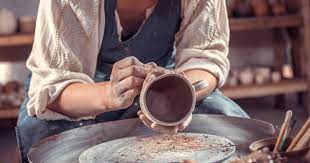The Art of Artisan: Celebrating Handcrafted Excellence
Artisan, a term that conjures images of meticulous craftsmanship, attention to detail, and a deep-rooted passion for creating something truly exceptional. In a world where mass production often reigns supreme, artisans stand out for their dedication to preserving traditional techniques and infusing their creations with a touch of individuality.
At the heart of artisanal work lies a profound respect for the materials used and the processes involved. Whether it’s a skilled potter shaping clay into elegant vessels, a talented chocolatier handcrafting delectable treats, or a master carpenter fashioning intricate furniture pieces, artisans pour their heart and soul into every creation.
One of the defining characteristics of artisanal products is their uniqueness. Each item bears the mark of its creator, reflecting their personality, style, and expertise. This personal touch not only adds to the allure of artisanal goods but also ensures that no two pieces are exactly alike.
Furthermore, artisans often draw inspiration from cultural traditions, local resources, and historical practices. By honoring these influences and infusing them with modern sensibilities, artisans create products that are both timeless and contemporary, bridging the gap between past and present.
Supporting artisans means more than just acquiring beautifully crafted items; it is also about championing sustainability, ethical production practices, and the preservation of heritage skills. By choosing artisanal products over mass-produced alternatives, consumers contribute to a more diverse and vibrant creative landscape.
In a world that values speed and efficiency above all else, artisans remind us of the beauty that lies in taking time to create something extraordinary. Their work serves as a testament to the enduring power of human creativity and ingenuity – a legacy worth celebrating and preserving for generations to come.
9 Compelling Benefits of Choosing Artisanal Goods: Celebrating Craftsmanship, Community, and Culture
- Unique and one-of-a-kind creations
- High level of craftsmanship and attention to detail
- Supports local artisans and small businesses
- Promotes sustainability and ethical production practices
- Preserves traditional techniques and cultural heritage
- Offers personalized and customizable options
- Creates jobs in the community
- Provides a connection between creator and consumer
- Celebrates individuality and creativity
Four Drawbacks of Choosing Artisanal Products: Cost, Availability, Consistency, and Accessibility Challenges
- Higher cost compared to mass-produced alternatives
- Limited availability due to the time-intensive nature of artisanal production
- Variability in quality and consistency across different artisanal products
- Potential difficulty in finding specific artisanal items outside of niche markets
Unique and one-of-a-kind creations
One of the standout advantages of artisanal products is the allure of owning unique and one-of-a-kind creations. Unlike mass-produced goods that are identical in every batch, artisanal items bear the distinct imprint of their creator, making each piece a treasure with its own story to tell. This exclusivity not only adds a special charm to the product but also allows individuals to express their individuality and appreciation for craftsmanship in a world inundated with uniformity. The appeal of owning something truly one-of-a-kind is a testament to the enduring appeal and value of artisanal craftsmanship.
High level of craftsmanship and attention to detail
The hallmark of artisanal creations lies in their unparalleled level of craftsmanship and meticulous attention to detail. Artisans, with their expert skills honed over years of dedication, infuse each piece they create with a sense of precision and artistry that is simply unmatched. From intricate carvings to delicate hand-painted designs, every element is carefully executed to perfection, resulting in products that exude a sense of quality and refinement that can only be achieved through the hands of a true master craftsman.
Supports local artisans and small businesses
By embracing artisanal products, we actively support local artisans and small businesses, fostering a sense of community and promoting economic sustainability. These skilled individuals pour their expertise and passion into their creations, infusing each piece with a unique charm that reflects the essence of their craft. Choosing artisanal goods not only allows us to connect with the stories and traditions behind the products but also empowers local artisans to thrive and continue sharing their talents with the world.
Promotes sustainability and ethical production practices
The practice of artisan craftsmanship promotes sustainability and ethical production practices by prioritizing quality over quantity, utilizing eco-friendly materials, and supporting local communities. Artisans often source their materials from sustainable suppliers, reducing the environmental impact of their creations. By producing goods in small batches and focusing on durability and longevity, artisans contribute to a culture of conscious consumption that values craftsmanship and ethical labor practices. Additionally, by engaging in fair trade principles and maintaining transparent supply chains, artisans uphold the values of integrity and social responsibility in their work.
Preserves traditional techniques and cultural heritage
One significant advantage of artisans is their ability to preserve traditional techniques and cultural heritage through their craft. By dedicating themselves to time-honored methods passed down through generations, artisans ensure that valuable skills and practices are not lost to the sands of time. Through their work, artisans breathe new life into age-old traditions, keeping cultural heritage alive and vibrant for future generations to appreciate and cherish.
Offers personalized and customizable options
One of the standout benefits of choosing artisan products is the opportunity they provide for personalized and customizable options. Artisans excel in tailoring their creations to suit individual preferences, allowing customers to imbue their purchases with a unique touch that reflects their personality and style. Whether it’s selecting specific colors, materials, or design elements, the ability to collaborate closely with artisans ensures that each piece is truly one-of-a-kind and perfectly aligned with the customer’s vision. This level of customization not only enhances the overall shopping experience but also results in cherished items that hold special meaning for their owners.
Creates jobs in the community
The artisan industry plays a crucial role in fostering economic growth and stability by creating jobs within the community. By supporting local artisans and their craft, we not only celebrate creativity and tradition but also contribute to the livelihoods of individuals who rely on their skills to make a living. These jobs not only provide financial support but also help preserve cultural heritage, promote sustainable practices, and strengthen the social fabric of the community as a whole.
Provides a connection between creator and consumer
Artisans provide a unique and invaluable connection between creator and consumer. By crafting each piece with care and skill, artisans infuse their creations with a sense of personal touch and authenticity that resonates with those who appreciate fine craftsmanship. This direct link between the maker and the buyer not only adds a layer of transparency to the production process but also fosters a deeper appreciation for the artistry and dedication that goes into each artisanal piece. Through this connection, consumers are able to forge a meaningful relationship with the products they purchase, knowing that they are supporting individual creators and their passion for their craft.
Celebrates individuality and creativity
Artisans celebrate individuality and creativity by infusing their unique style, personality, and innovative ideas into each handcrafted creation. Through their work, artisans showcase the beauty of diversity and the boundless possibilities that arise from embracing one’s distinct voice and vision. By honoring individuality and nurturing creativity, artisans not only produce exceptional goods but also inspire others to explore their own creative potential and express themselves authentically.
Higher cost compared to mass-produced alternatives
One notable drawback of artisanal products is their higher cost in comparison to mass-produced alternatives. The meticulous craftsmanship, attention to detail, and personalized touch that define artisanal goods often require more time, skill, and resources, resulting in a higher price tag. While some may find the premium worth paying for the quality and uniqueness offered by artisanal products, the elevated cost can be a barrier for those seeking more budget-friendly options. This pricing disparity underscores the economic challenges faced by artisans in competing with mass production on a purely cost-driven basis.
Limited availability due to the time-intensive nature of artisanal production
One significant drawback of artisanal products is their limited availability, stemming from the time-intensive nature of their production process. Unlike mass-produced goods that can be churned out in large quantities at a rapid pace, artisans dedicate considerable time and effort to meticulously handcraft each item. This meticulous attention to detail and commitment to quality inevitably results in a slower production rate, leading to limited quantities of artisanal products being available for purchase. As a result, consumers may encounter challenges in obtaining their desired artisanal goods promptly, requiring patience and anticipation for these unique creations.
Variability in quality and consistency across different artisanal products
One notable disadvantage of artisanal products is the variability in quality and consistency that can be observed across different items. Due to the handcrafted nature of artisanal goods, each piece is unique and may exhibit slight variations in texture, color, or overall finish. While this individuality adds to the charm of artisanal products, it can also lead to inconsistencies in quality that may not always meet the expectations of consumers seeking uniformity. As a result, customers may encounter fluctuations in product standards when purchasing artisanal items, posing a challenge for those who prioritize predictability and uniformity in their purchases.
Potential difficulty in finding specific artisanal items outside of niche markets
One notable downside of artisanal products is the potential difficulty in locating specific items outside of niche markets. Due to the specialized nature of artisanal craftsmanship and the limited production capacity of individual artisans, certain unique or custom-made pieces may not be readily available in mainstream retail outlets. This can pose a challenge for consumers seeking a particular artisanal item, as they may need to explore niche markets, boutique shops, or directly contact artisans to fulfill their specific requirements. While this aspect adds an element of exclusivity and rarity to artisanal goods, it can also limit accessibility for those outside of dedicated artisanal communities.



